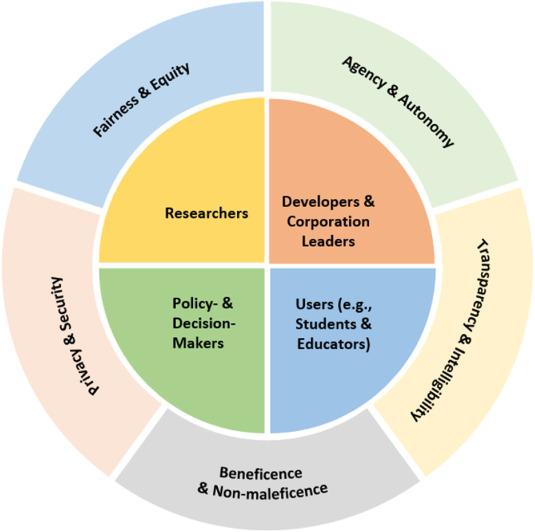Ethical Considerations of AI in Education: Balancing Innovation and Integrity
As artificial intelligence (AI) continues to transform the education sector, stakeholders face a pivotal challenge: how to foster technological innovation while upholding ethical integrity. From personalized learning experiences powered by AI algorithms to advanced administrative automations, AI in education offers exciting possibilities. Tho, these advances bring forth critical ethical questions regarding privacy, fairness, transparency, accountability, and the true meaning of equitable learning. In this article, we delve deep into the ethical considerations of AI in education and provide actionable insights for educators, policymakers, and edtech developers seeking to balance progress with obligation.
Benefits of AI in Education: Unlocking Innovative Opportunities
- Personalized Learning: AI-driven platforms can adapt content and pace to individual learning styles, enhancing student engagement.
- efficiency in Governance: Automated grading and data analysis streamline repetitive tasks and free up educators’ valuable time.
- Data-Driven Insights: AI can provide teachers with analytics to inform instructional decisions and identify at-risk students early.
- Accessibility: AI-powered tools can accommodate students with disabilities,making education more inclusive.
- global Reach: AI facilitates accessible, quality education on a global scale, bridging geographical and resource gaps.
Key Ethical considerations for AI in Education
The integration of artificial intelligence into educational contexts presents multifaceted ethical dilemmas. Below are the central themes educators and developers must consider for responsible AI adoption in schools and universities.
1. Privacy and Data Security
- Student Data Protection: AI systems often process vast amounts of sensitive student information. Ensuring compliance with laws like FERPA and GDPR is vital for safeguarding privacy.
- Informed Consent: Schools and technology providers must be clear about data collection,usage,and storage practices.
- Cybersecurity Risks: Centralized digital platforms can be targets for cyberattacks, making robust security protocols a non-negotiable standard.
2. Fairness, Bias, and Equity
- Algorithmic Bias: AI algorithms can inadvertently perpetuate or even amplify biases against marginalized student groups if not designed and monitored properly.
- Digital Divide: Students in underfunded schools may lack access to AI-powered tools, widening educational disparities rather than closing them.
- Fair Assessment: Reliance on AI for testing and evaluation must be regularly audited to ensure assessments remain objective and inclusive.
3. Transparency and Explainability
- Understandable AI: Students,parents,and educators should be able to grasp how AI-based recommendations or grades are generated.
- Clear Communication: Schools should provide documentation and training to demystify AI processes for all stakeholders.
4.Accountability and Responsibility
- Who is Accountable? If an AI-led decision is flawed, it must be clear whether responsibility lies with teachers, administrators, or technology vendors.
- Oversight Mechanisms: Human oversight should remain in place to review and, if necessary, override algorithmic decisions.
Case Studies: Real-World Ethical Challenges
Case Study 1: Bias in Predictive Analytics
In a well-known example from the United States, a predictive analytics tool was used by several school districts to assign resources to students deemed “at risk” of dropping out. Subsequent analysis revealed that the tool underestimated the potential of students from certain ethnic backgrounds due to biased training data. This led to unequal allocation of academic support, highlighting the urgent need for continuous auditing of AI systems to ensure equitable outcomes.
Case Study 2: Data Privacy Breach in EdTech
An educational technology platform experienced a significant data breach, exposing sensitive information including grades and behavioral records. While the tool provided innovative classroom management features, insufficient encryption and lax authentication protocols undermined trust. The incident sparked new privacy mandates and a push for stricter cybersecurity standards in educational AI solutions.
practical tips for Ethical AI Adoption in Education
- Develop Ethical Guidelines: Establish and enforce a code of ethics specific to AI deployment in your educational institution.
- Engage Stakeholders: Involve teachers, students, and parents in the decision-making and evaluation processes for educational AI tools.
- Audit AI Regularly: Perform routine checks on AI algorithms for bias, transparency, and security vulnerabilities.
- Prioritize Professional Progress: Offer regular training for educators to stay updated on AI trends and ethical best practices.
- Maintain Human oversight: AI should complement, not replace, teacher judgment and personal student support.
Frist-Hand Experience: voices from the Classroom
“integrating AI-based personalized learning tools has allowed me to better support students with diverse learning needs. Though, I remain vigilant about how student data is used and always advocate for transparency in our school’s technology policies.”
— Sarah Mitchell,High School Teacher
“While AI helps us spot trends that a human might miss,it doesn’t replace the personal connection between teacher and student. We need robust ethics training to ensure AI tools support—not hinder—our students’ growth.”
— David Lee, Educational Technology Coordinator
conclusion: Navigating the Future with Integrity
The ethical considerations of AI in education demand constant vigilance, open dialog, and strategic planning. While AI unlocks transformative benefits—from personalized learning to streamlined administration—the sector’s responsibility is to ensure innovation does not come at the expense of privacy, equity, or trust.
By embracing transparent,fair,and accountable practices,educational institutions can harness the power of AI responsibly. Ultimately, balancing innovation and integrity will ensure that the future of education remains inclusive, inspiring, and ethical.

